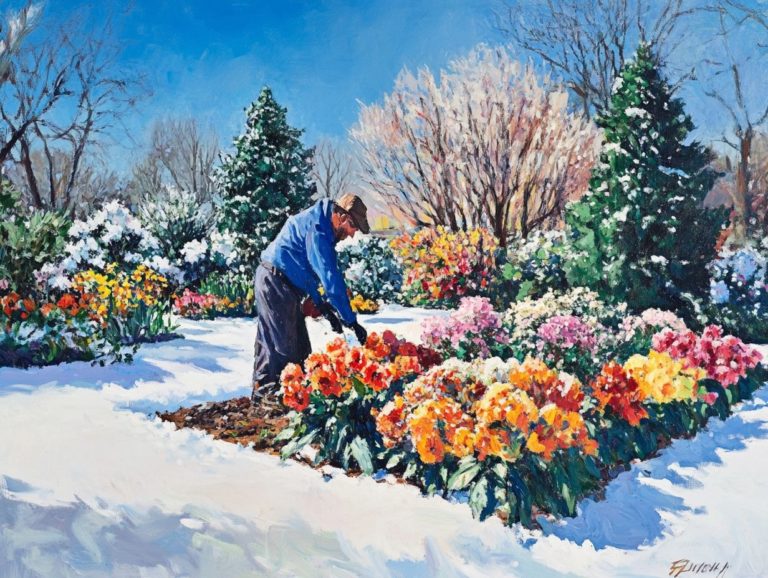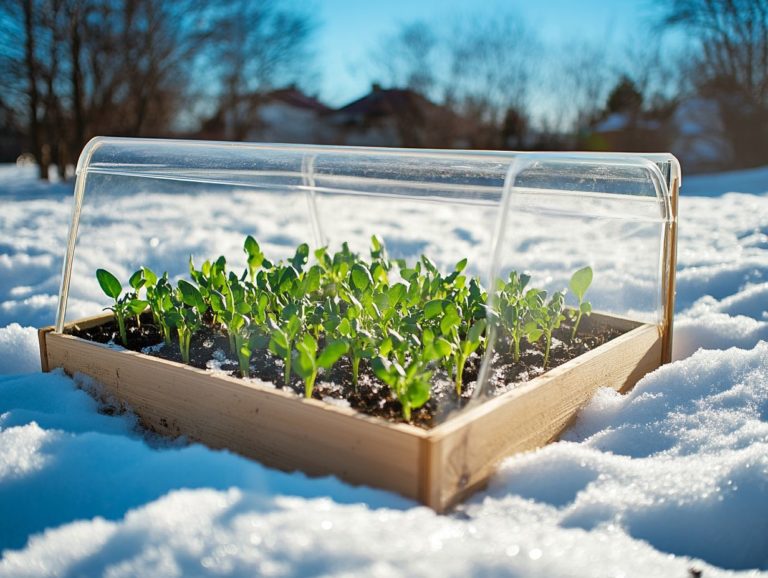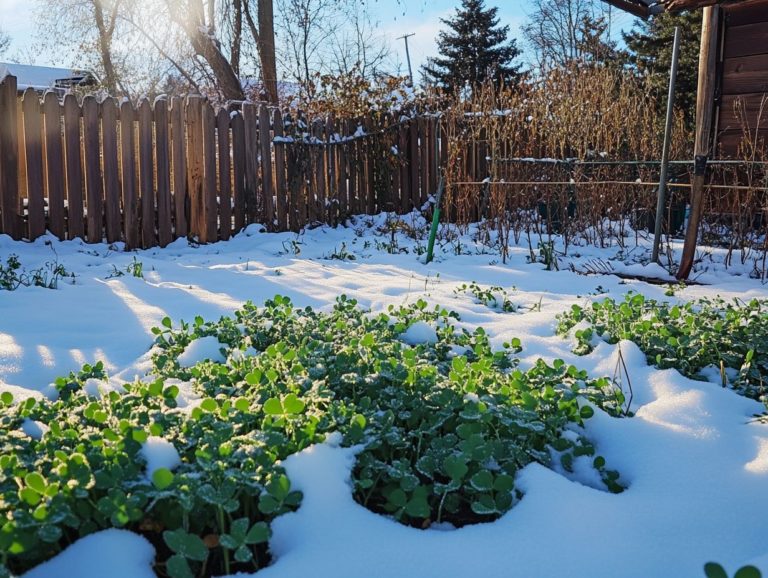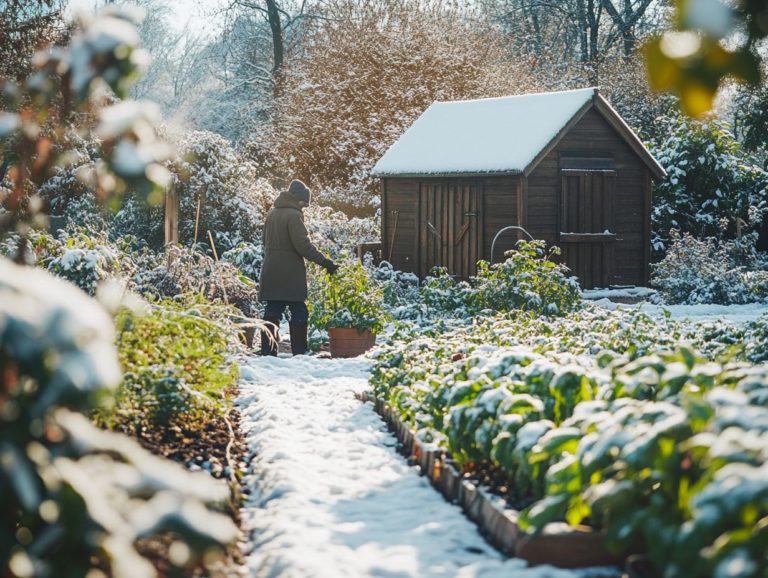Preparing Your Garden for Winter: Key Steps
As the vibrant hues of autumn begin to wane, it s time for you to ready your garden for the impending chill of winter.
Engaging in proper winter preparation not only safeguards your plants but also lays the groundwork for a bountiful spring.
From removing dead plants and debris to insulating your perennials and maintaining your gardening tools, each action you take is vital for a seamless transition.
This article delves into the essential tasks that will ensure your garden not only survives the cold months but thrives well beyond them.
Contents
Key Takeaways:
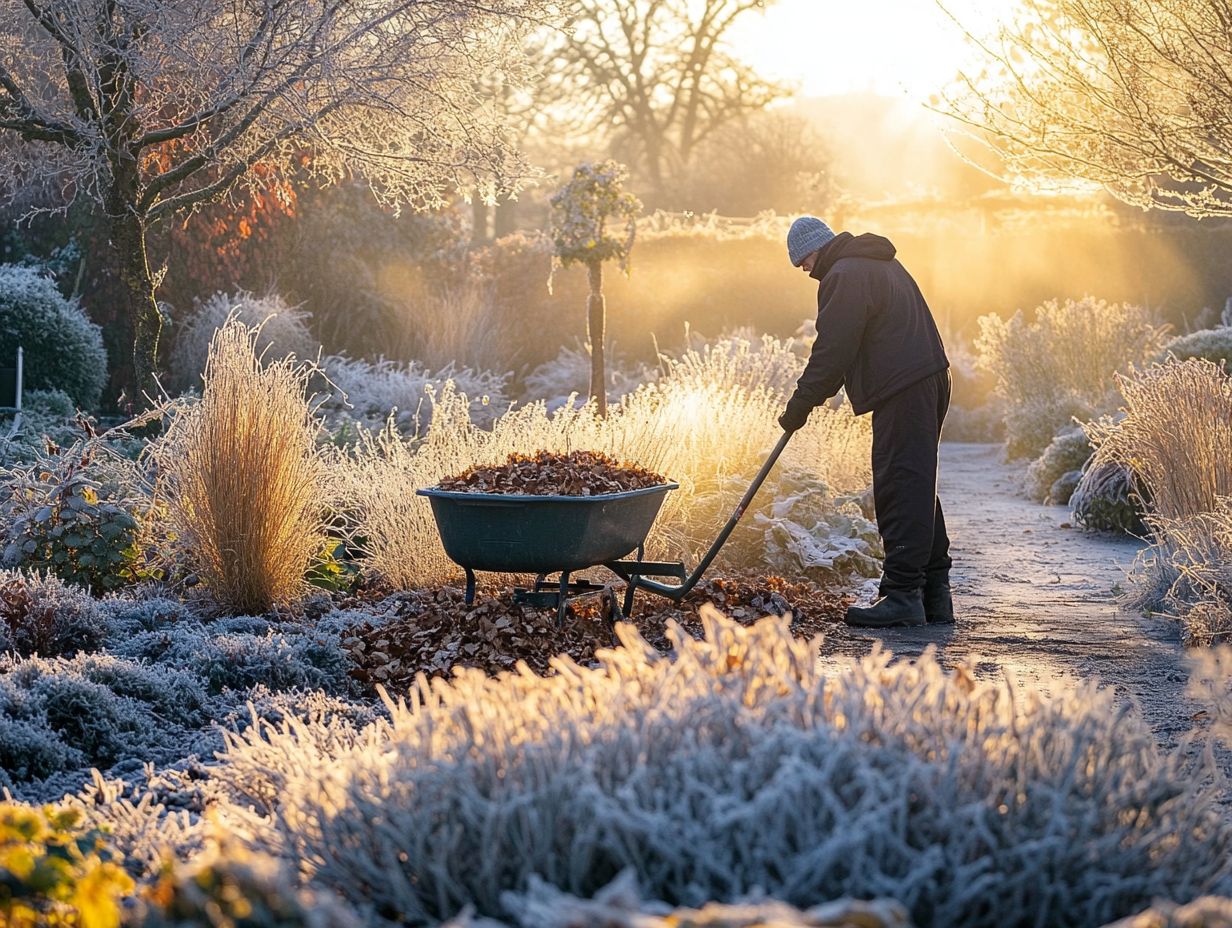
- Getting your garden ready for winter is your ticket to a thriving and healthy garden all year round.
- Clearing out annual plants and debris, protecting perennials and trees, and preparing soil are essential steps in preparing your garden for winter.
- Don’t forget to maintain and store your gardening equipment and plan for spring by selecting seeds and planning your winter garden.
Why Prepare Your Garden for Winter?
Preparing your garden for winter is vital for its long-term health and productivity. As summer gives way to cooler temperatures, preparing your garden for the first frost and protecting the natural balance in your garden soil becomes essential.
By safeguarding your nutrient-rich soil during the winter months, you allow beneficial soil microbes to flourish, ultimately fostering healthier plant growth in the upcoming gardening season.
Taking a moment to reflect on your garden s specifics now will pave the way for a successful spring planting, making this preparation an invaluable investment in your gardening future.
Benefits of Winter Preparation
Preparing your garden for winter brings a wealth of benefits that can elevate its overall health and productivity. By dedicating time to properly ready your garden for the colder months, you can significantly enhance soil health with essential guidelines for winter plant care.
Ensuring that essential nutrients remain accessible for spring planting promotes a better nutrient balance, allowing you to enrich the soil with organic matter, fostering a flourishing ecosystem.
Careful winter practices significantly reduce weed growth, minimizing competition for vital resources when the growing season returns. Implementing effective pest management strategies during winter will further safeguard your plants from potential infestations, setting the stage for a vibrant garden that s primed to thrive as the warmer weather approaches.
Clearing Out Your Garden
Clearing out your garden is an essential step in preparing it for winter. You must remove any dead plants and debris to promote optimal soil health, and consider following tips for sustainable winter gardening during this process.
After the summer s decline and any potential damage from hail, it s crucial to tidy up your garden beds by eliminating leftover organic matter that could invite pests or diseases. This process lays the groundwork for effective winter preparation, aids in weed management, and ensures that your crops like green tomatoes and garlic can flourish in a cleaner environment come spring.
Removing Annual Plants and Debris
Removing annual plants and debris is essential for effective garden maintenance as winter approaches. As cooler temperatures set in, protecting your garden from winter pests and embracing best practices enhances the beauty of your garden and fosters healthier soil.
Timing is key; clearing out spent annuals and debris before the first frost minimizes overwintering sites for pests. Techniques like careful uprooting and composting healthy plant matter enrich your soil while ensuring that pathogens don t carry over into the next growing season.
By being proactive in this maintenance routine, you contribute significantly to a thriving ecosystem, setting the stage for robust plant growth when spring arrives.
Protecting Perennials and Trees

Protect your perennials and trees during winter. This ensures their survival and vitality for the upcoming gardening season.
As frost begins to make its presence known, applying the right insulation and mulching techniques can effectively shield the root systems of your garden plants. This stops frost from pushing the soil up and disturbing the roots.
By focusing on these protective measures, you ll help your perennials and trees withstand harsh winter conditions. This allows them to emerge healthy and vibrant come springtime.
Insulating and Mulching Techniques
Use effective insulating and mulching techniques to keep your garden thriving all winter long! By implementing these methods, you can ensure that your plants not only survive but thrive, even in the face of harsh conditions.
One popular technique is to cover the soil with a layer of organic material, such as straw or shredded leaves. This creates a cozy blanket that traps heat and forms a protective barrier against frost.
You might also consider incorporating materials like wood chips or bark. These help regulate soil temperature and maintain moisture levels.
This dual approach not only shields your plants from severe weather but also enriches the soil as the organic matter breaks down. This promotes a healthier garden ecosystem throughout the year.
Preparing Soil for Winter
Preparing your soil for winter is a crucial practice. It guarantees health and productivity for the upcoming gardening season.
By incorporating soil amendments and establishing cover crops, you enhance the nutrient balance and nutrient-holding capacity of your soil. This allows it to rest and rejuvenate during the colder months.
Utilizing soil testing kits offers valuable insight into existing nutrient levels, enabling you to make informed decisions on the necessary amendments to enrich your garden beds for spring planting.
Soil Amendments and Cover Crops
Soil amendments and cover crops are essential for preserving soil health and fertility during winter. By enriching the soil with nutrients, these practices elevate productivity and bolster the ecosystem’s resilience.
Incorporating organic amendments, such as compost or well-rotted manure, enhances soil structure, promotes better drainage, and boosts microbial activity.
Meanwhile, cover crops like clover or rye provide valuable ground cover. They effectively prevent soil erosion and suppress weeds while playing a vital role in nitrogen fixation, improving nutrient availability for the crops that follow.
Together, these strategies cultivate a balanced environment that supports plant health, fosters biodiversity, and ultimately sets the stage for robust harvests come spring.
Equipment Maintenance for Winter
Maintaining your garden equipment during winter is essential for ensuring longevity and performance in the upcoming gardening season.
Proper cleaning and storage of your tools extend their lifespan. They also prime them for efficient use when spring arrives.
By dedicating time to care for your equipment now, you minimize the risk of damage. This ensures your tools are fully prepared for tasks like soil aeration and planting vegetable seeds when the season unfolds.
Cleaning and Storing Garden Tools
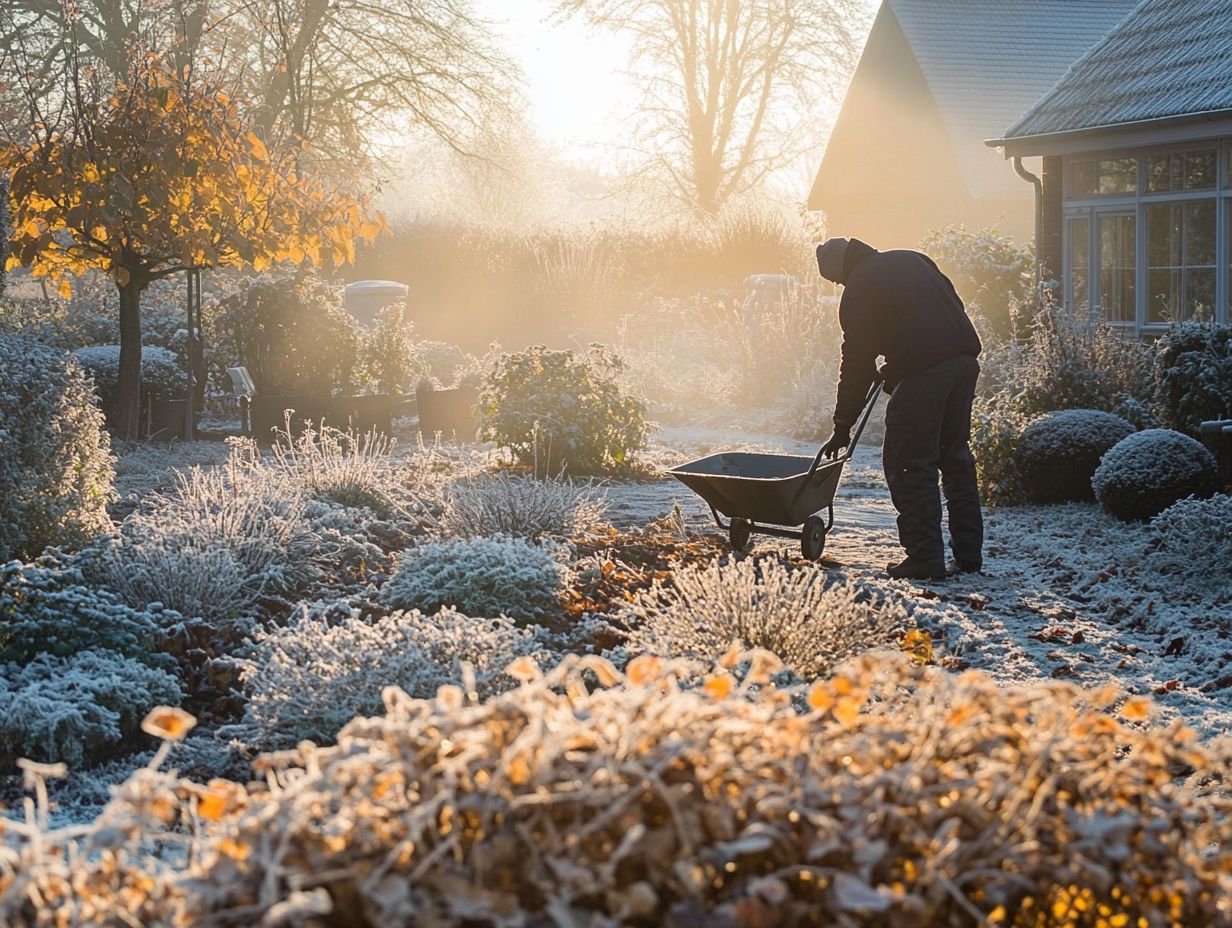
Cleaning and storing your garden tools properly is crucial for great winter care. By following a few simple steps, you can ensure your tools remain in peak condition.
- Begin by thoroughly cleaning each tool to eliminate dirt, sap, and rust. These can compromise materials over time.
- For metal tools, a wire brush works wonders for scrubbing away stubborn remnants. Wooden handles should be gently wiped down with a damp cloth.
- After cleaning and drying your tools, make sure to dry them completely to prevent any rust from forming.
- Put a light coat of oil on your tools to protect against corrosion.
- Finally, organize and store your tools in a dry, sheltered space like a shed or garage. Ideally, use hooks or a toolbox to keep them neatly arranged and easily accessible when spring comes around.
Planning for Spring
Planning for spring is exciting! Winter offers the ideal opportunity to reflect and organize your garden projects.
By maintaining detailed notes throughout the season, you can evaluate what flourished and what requires a bit more attention for your upcoming spring planting.
Whether you re contemplating an expansion of your garden or meticulously selecting specific vegetable seeds, crafting a thoughtful plan now will prepare you for a productive and successful gardening season ahead.
Winter Garden Planning and Seed Selection
Effective winter garden planning requires your careful attention to seed selection to ensure a great harvest come spring.
Choosing the right vegetable seeds is essential. Winter’s harsh conditions can pose unique challenges. Start by researching varieties that thrive in cooler temperatures. Focus on resilient options like kale, spinach, and carrots, which can withstand frost.
Once you’ve identified the ideal seeds, it’s time to organize your projects with precision. Consider starting with seed trays small containers to start seeds indoors to give your seedlings a head start. Proper timing and spacing are vital for maximizing sunlight exposure, leading to healthier plants.
With diligent planning and a keen awareness of your local climate, you can savor the freshness from your winter garden, even in the coldest months.
Frequently Asked Questions
What are the key steps for preparing my garden for winter?
The key steps for preparing your garden for winter include cleaning up your garden, protecting your plants, and winterizing your garden to prepare your soil for the colder months.
When should I start preparing my garden for winter?
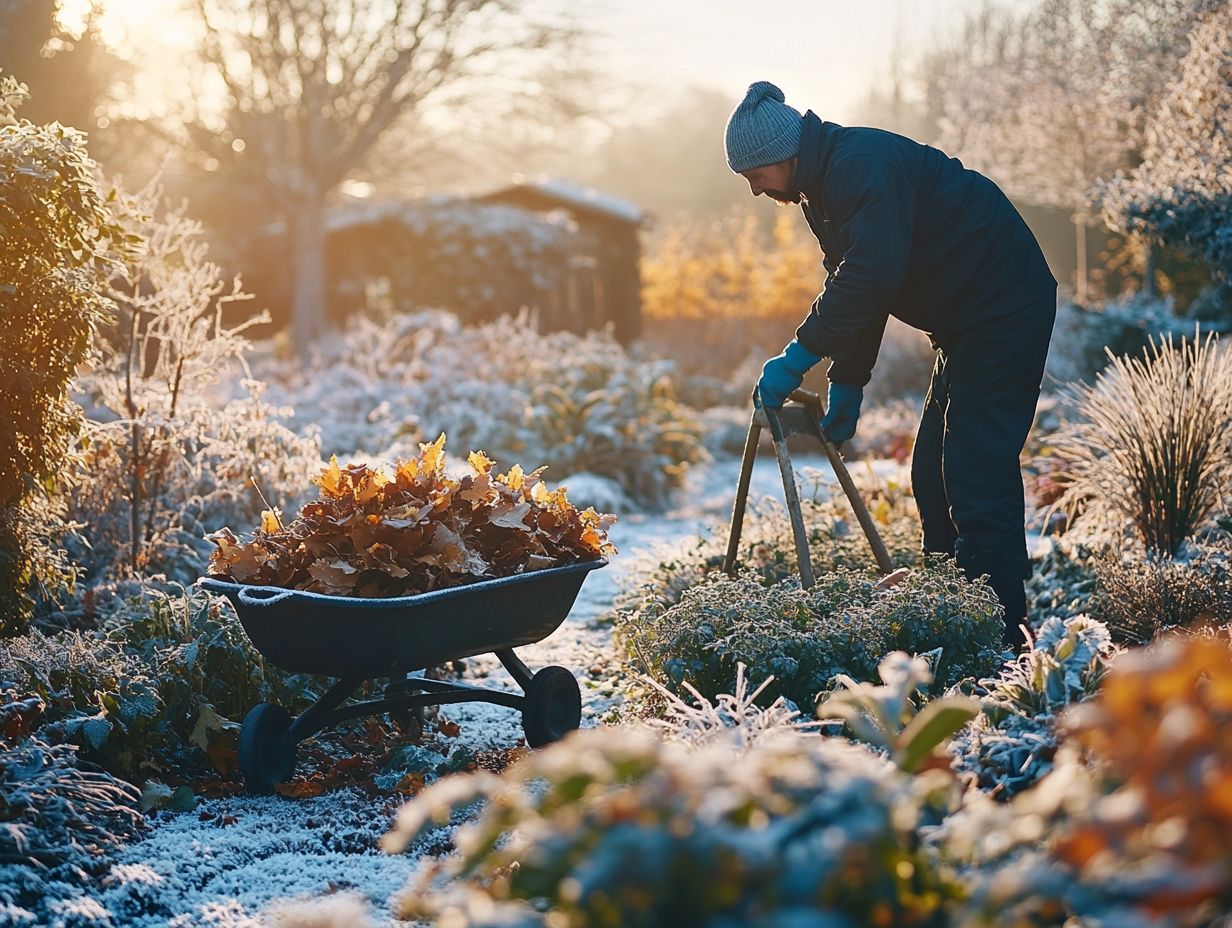
Start preparing your garden in late summer or early fall, before the first frost hits.
How do I clean up my garden for winter?
To clean up your garden for winter, remove any dead plants, leaves, and debris. Cut back any perennials that have finished blooming. Additionally, consider following best practices for winter gardening and mulch your garden beds as well.
What can I do to protect my plants during the winter?
There are a few ways to protect your plants during the winter. Cover them with a layer of mulch or use protective coverings like burlap or frost cloths.
Do I need to fertilize my garden before winter?
Yes, it’s a good idea to fertilize your garden before winter. This provides your plants with essential nutrients during the dormant season.
How do I prepare my soil for winter?
To prepare your soil for winter, add a layer of compost or organic matter. This will help improve the soil’s structure and provide nutrients for your plants.
Act now to ensure healthy tools and a thriving garden!

